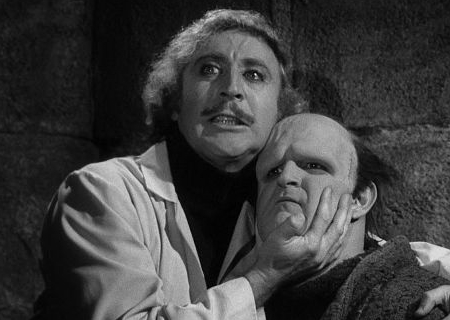PB Shelley, Preface to Frankenstein
Still from James Whale's Frankenstein (1931)
“The event on which this fiction is founded has been supposed, by Dr. Darwin, and some of the physiological writers of Germany, as not of impossible occurrence. I shall not be supposed as according the remotest degree of serious faith to such an imagination; yet, in assuming it as the basis of a work of fancy, I have not considered myself as merely weaving a series of supernatural terrors. … [H]owever impossible as a physical fact, [Frankenstein] affords a point of view to the imagination for the delineating of human passions more comprehensive and commanding than any which the ordinary relations of existing events can yield…
… Other motives were mingled with [this one] as the work proceeded. I am by no means indifferent to the manner in which whatever moral tendencies exist in the sentiments or characters it contains shall affect the reader; yet my chief concern in this respect has been limited to… the exhibition of the amiableness of domestic affection, and the excellence of universal virtue. The opinions which naturally spring from the character and situation of the hero are by no means to be conceived as existing always in my own conviction; nor is any inference justly to be drawn from the following pages as prejudicing any philosophical doctrine of whatever kind.
It is a subject also of additional interest to the author that this story was begun in the majestic region where the scene is principally laid, and in society which cannot cease to be regretted. I passed the summer of 1816 in the environs of Geneva. The season was cold and rainy, and in the evenings we crowded around a blazing wood fire, and occasionally amused ourselves with some German stories of ghosts, which happened to fall into our hands. These tales excited in us a playful desire of imitation. Two other friends (a tale from the pen of one of whom would be far more acceptable to the public than anything I can ever hope to produce) and myself agreed to write each a story founded on some supernatural occurrence.
The weather, however, suddenly became serene; and my two friends left me on a journey among the Alps, and lost, in the magnificent scenes which they present, all memory of their ghostly visions. The following tale is the only one which has been completed.”
Jon Kerr Comments:
The Villa Diodati.
The Preface to Frankenstein—written by Percy, oddly enough—brings us back to the now legendary moment of inspiration that gave us Mary Shelley’s famous novel: vacationing at Lake Geneva with a circle of friends and fellow writers, the Shelleys are confined indoors due to inclement weather. Reading German horror stories by candlelight, the crew eventually settles on a competition proposed by Lord Byron. The competition is simple: who can write the best horror story? In the months and years ahead, Byron and Percy—the two literary heavyweights of the party—lose interest and take up other projects; Mary, meanwhile, sets to work on what will become Frankenstein, one of the most celebrated English novels of all time.
Percy’s Preface gives us much more than biographical fun-facts, however. It also shines interesting light on the kinds of theories, world events, and reading materials that preoccupied Mary (and Percy) as Frankenstein gradually came into being. The “Dr. Darwin” alluded to in the opening paragraph is not Charles but rather his grandfather, Erasmus Darwin, a scientist in his own right who believed that with enough know-how, scientists could soon learn how to galvanize human corpses. According to Percy, Mary’s novel draws on theories put forward by the scientists of her day, which qualifies Frankenstein as one of the first science fiction novels.
The Preface also reveals a little bit about how Percy read his wife’s novel. As Percy sees it, the strength of Mary’s novel lay in its powerful depiction of family relationships and its optimistic rendering of human virtues. Apparently, Percy read Frankenstein as many contemporary readers still do: as expressing Rousseau’s idea that people are born inherently good, only to be made wicked by a corrupt society. It seems clear from this kind of critical engagement that Percy understood the exceptional power of Frankenstein, and regarded Mary as an author with a truly “comprehensive and commanding” understanding of the human condition.
I, for one, am left with some questions on reading the Preface. For example, Percy seems to regard Victor, rather than the creature, as the hero of the novel. What heroic qualities do you think Shelley could have envisioned in a character that most readers now see as the novel’s villain? Give us your thoughts in the comments section!
Jon Kerr is a recently graduated from the University of Toronto with his PhD in English literature with a specialization in the Romantics. He is currently at Mount Alison University in New Brunswick, Canada on a post doctoral fellowship.



